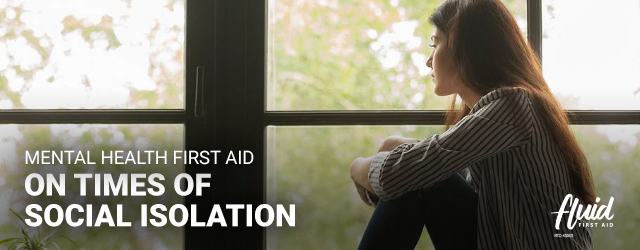The First Aid Australia News+
Mental Health First Aid on times of social isolation
- April 6, 2020
- Posted by: Julian Miana
- Category: First aid

The outbreak of COVID-19 has imposed changes and restrictions on social interactions. We have been instructed to stay at home and to keep spatial distancing to prevent the spread of the virus. However, what are the consequences of social isolation on our mental health and how can we better manage it?
Social isolation impacts people in different ways: anxiety from being indoors 24-7, feelings of depression, fear of the future (no-one is in direct control of this situation), or panic attacks that originate in the uncertain context we’re in. Some of these reactions are normal and expected.
However, there are other signs that could help you identify when a person is struggling and needs help. Extreme emotional reactions, struggling to get out of bed, excessive drinking or use of drugs, sleeping all day, are some examples of behaviours of someone having problems not coping with social isolation and the added stresses of this situation.
In order to help them it’s important we:
- Address their worries: listen to them and give them your undivided attention. Help them understand you’re there for them.
- Encourage activity: Creating a routine gives you structure, including planning fun activities to help make it easier to get through the day.
- Reduce the amount of media and constant updates, if possible: If you feel you are in a better place, you can do the update for them.
- Keep in touch: If this is not a person that you’re living with, try to call them, chat or facetime with them. Talking to someone and having someone care for you is one of the remedies for isolation.
Now to help others, you need to help yourself as well. So here are some tips to cope better with isolation:
- Limit your media exposure: Watching, reading, or listening to ongoing coverage can leave you feeling further isolated and depressed, and can increase symptoms of acute stress. Give yourself large breaks from COVID-19 related coverage, including through social media channels.
- Daily routine: Create a routine that prioritises things you enjoy and even things you have been meaning to do but haven’t had enough time. Read that book, watch that show, take up that new hobby.
- Keep yourself busy and connected, while social distancing: Take the time to practice self-care when isolated. Do the things you love – cook, read, or connect with others (virtually). Even if you are physically restricted, support is available over the phone or online.
- Don’t let your feelings overwhelm you: Worrying about worst-case scenarios only adds to stress. Keep things in perspective, and work on what you can control – such as following expert advice, social distancing, and practising good hygiene.
- Children may need your guidance: While it may be hard for adults when faced with uncertainty, children will need even more help with how to cope. Moderate what they see and hear and make sure your discussions are age-appropriate. Let them ask questions, and dispel any misinformation they may have picked up from friends or social media.
- Seek support: You may also wish to seek professional help from your GP, psychologist, or a qualified counsellor.
- Be generous to others: Giving to others in times of need not only helps the recipient, but it also enhances your wellbeing too. Here is a way to help others around you.
- Stay connected with your values: Don’t let fear or anxiety drive your interactions with others. We are all in this together!
Remember even though we have to practice social distancing you’re not alone!
Leave a Reply Cancel reply
You must be logged in to post a comment.